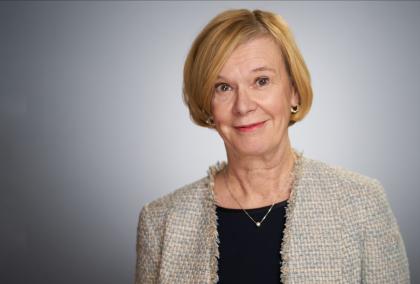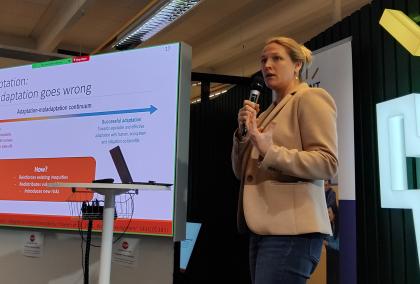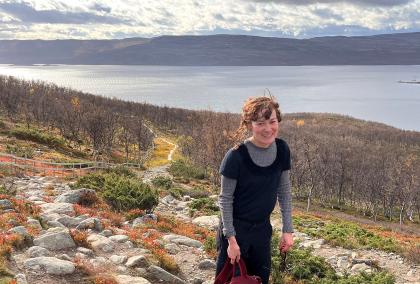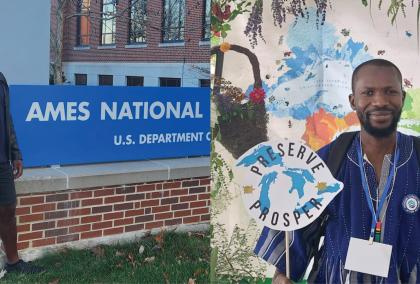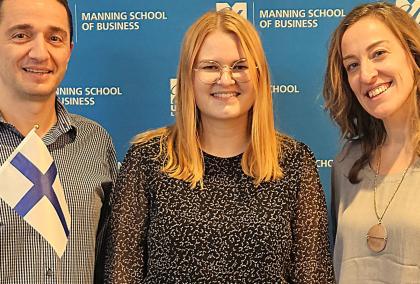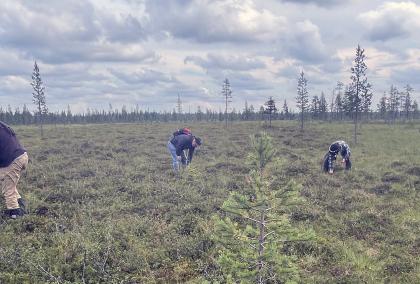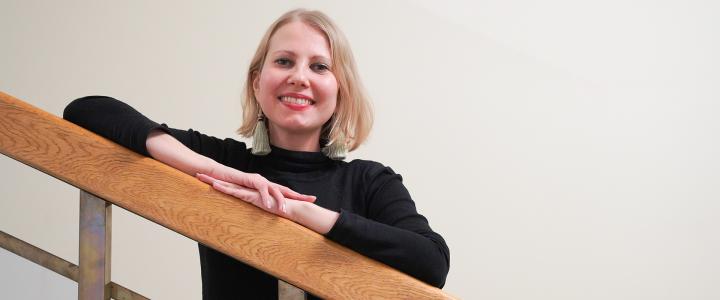

With a background in community education, and having worked for the Finnish Deaf Association, Kaarina has a longstanding interest in human rights, accessibility, and civic activism. However, her true calling has always been journalism.
“I always dreamed of being a journalist since I was young. I’ve always been interested in acquiring knowledge, compiling all the information I could gather, and communicating what I discovered. But I felt like society, and the journalism profession in general, isn’t the most accessible for a deaf person.”
After graduating from high school in Turku, Finland, Kaarina studied community development at Humak University of Applied Sciences, specializing in NGO and youth work. In 2011 she was awarded a Fulbright Finland Undergraduate Grant to Gallaudet University in Washington, D.C., a university for the deaf and hard of hearing, where she took courses in communications, deaf studies, and social work. This experience, she says, laid the groundwork for her decision to change careers and retrain as a journalist.
A New Sense of Freedom and Confidence
“Studying at Gallaudet was an eye-opening experience. The university system in the U.S. was very different from ours. I had the chance to choose a wider variety of courses that I otherwise wouldn’t have been able to include in my degree in Finland. But what I liked the most was that I didn’t have to think about accessibility issues myself. Attending classes and courses in Finland, it’s an everyday thing you have to think about: how is my accessibility going to work out in this course? You’re not completely free to just concentrate on the work you’re doing. You have to be aware all the time of your possibility to have complete access, and arrange all your studies more rigorously. At Gallaudet, I felt free to just be a student, to take courses and learn.”
The courses offered at Gallaudet, Kaarina explains, are taught entirely in American Sign Language. “It’s the only deaf university in the world. People come from all over the States to study there, and there are also a lot of international students, from Asia, Europe, Africa, South America, and Canada, so the environment is very diverse. My year abroad changed my worldview. It gave me a richer and more international perspective. I was also better networked through everyone I met in the States.”
“Something I found very inspiring was that the students there were braver to say what they think about things. Since then, I’ve gained more courage to express my opinions on different subjects. In the States, there were so many different people, the environment was so culturally diverse. I felt like everyone is allowed to be who they are, everyone is entitled to say what they’re thinking and express themselves. Maybe that aspect of American culture is where the confidence comes from.”
“I started to believe in my dreams more. Before that exchange experience, I was less sure of myself. But when I applied for the scholarship and got it, I felt that yes, I can achieve what I dream of, if I’m ready to put my energy into working on it. Some people have more privileges than others, and some of us need to work harder than others to pursue our dreams, but nothing is impossible. That’s the most important and amazing impact it had on me. You never know, why not apply for a scholarship? Why not try for anything else you dream of or aspire to?”
“The communications courses I took there reawakened my dream of working in journalism. It took many years, but eventually I found my way back. You could say the seed was planted then.”
Growing as a Journalist
Now, as a student of journalism and communications media at Haaga-Helia University of Applied Sciences in Helsinki, and working as a freelance journalist for different projects, including a vodcast (video podcast) for Yle, Finland’s national broadcasting company, Kaarina continues to champion human rights issues and accessibility for the Deaf community.
“I feel that what I learned from my work in the community educator profession really supports my studies in journalism. Human rights and social injustice questions are always at the forefront for me, as well as environmental issues.” After her first degree, Kaarina worked in a wide variety of settings, including schools and youth projects, the Finnish Deaf Association, and Aspa, a foundation offering services for people who need support with housing and everyday life. “Through my work and life experiences, I’ve seen things that are not visible in the media. This has given me a perspective I can bring out through my second career.”
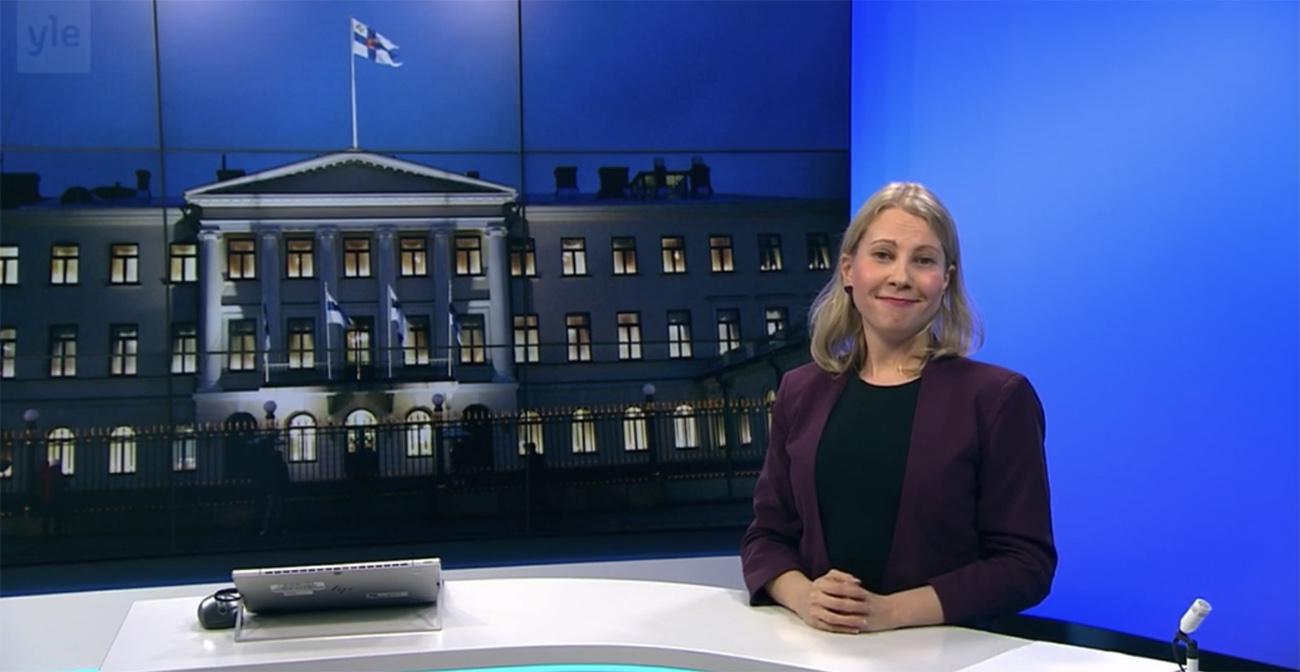
In summer 2020, Kaarina worked as a journalist for Yle, Finland’s national broadcasting service, an experience which convinced her of the need for more programs purely in sign language, and from Deaf people’s perspectives. Inspired by this, she started a sign language vodcast, focusing on current affairs. “Podcasts are a hugely successful phenomenon, but we as deaf people don’t have access to this part of culture. I thought it would be a great idea to create a vodcast for sign language users, where we can discuss current events and topics. It’s different from a television broadcast, with more of a discussional format, more laid back and less official.”
Over the past months, Kaarina’s vodcasts have covered a wide variety of topics, from the #DeafTalent movement in the entertainment industry, deaf sport, and the job situation for recent graduates during the pandemic, to accessibility, racism, and international politics. “We had an episode at the beginning of the year on the presidential election in the U.S. and the attack on congress. I had a contact I was able to interview for that, way back from my time in the States.”
Most recently, Kaarina interviewed Liisa Kauppinen, President Emeritus of the World Federation of the Deaf, and the first Finnish and Nordic recipient of the United Nations Human Rights Prize. “She explained how human rights are related to everyone’s everyday lives. We discussed deaf children’s lack of access to sign language, and the rights of women and girls. We also debated whether the Deaf community prefers to belong to cultural language minorities than to disability groups, or whether both groups are equally important for human rights from deaf people’s perspectives.”
Making Changes for Better Accessibility
The need for equality in accessing information has been brought into even sharper focus by the COVID-19 pandemic, Kaarina reflects. “Because of the pandemic, government information update broadcasts are interpreted live into sign language, so now they have a more systemized sign language interpreting system. I think that because of this deaf people have become more equal in how quickly they have access to this information. Before the pandemic, there was very little live interpretation, even for urgent information. Now I feel like they’ve started noticing how to make it accessible. It has to be current, it has to be on time.”
However, Kaarina says, the situation still needs improving. “There are people who don’t know sign language, who perhaps have lost their hearing later in life, or haven’t had the opportunity to learn sign language. These people need subtitling. A very important change would be to have really accessible information through both interpreting and good quality subtitling.”
So, what needs to be done? “I think most importantly, it has to be in the legislature. If it’s not in the law, no one will realize we need to do anything. There are laws on accessibility, but if everyone’s in compliance and there are still problems, the law needs to change first and foremost. The other main issue is funding - where to invest your money, your order of priorities. There needs to be a change in priorities to ensure accessibility and equality in information and communications.”
Kaarina notes the contrast between Finland and the U.S. in terms of media accessibility for the deaf. “In the States, now they’re almost at 100% subtitling. We’re not really there yet for automated subtitling and voice recognition in the Finnish language. So, technology is also something to invest in, as well as human resources - involving the people who know the most about accessibility issues. The basis of everything has to be people’s attitudes towards change, and whether they’re willing to ask for these changes.”
The Importance of Diverse Role Models
One way of changing people’s attitudes, Kaarina argues, is ensuring more accurate representations of Deaf people and other minority groups in the media.
“There was a recent study by Metropolia University of Applied Sciences, looking at the casting of roles in the Finnish TV and movie industry. They found that a little over 90% of actors are white, cis gendered, straight, and non-disabled. So, even though the real statistics in Finland show that there are a lot more people who are disabled, our television and movie industry are not representative of these facts. It’s a question of representation versus what our community is really made out of.”
“I don’t really have a lot of role models in the media industry, as someone aspiring to be a journalist and working in the media as a Deaf person. In the U.S., I saw Deaf people with many different professions. I was able to realize, ‘OK, that’s not an obstacle, it’s not impossible to do something I’m interested in.’ It’s very important to have role models in society representing all kinds of people. I think that the true representation of diversity is something we need to work on.”
Read more about Kaarina's work: https://huovinenkaarina.wordpress.com/
Read the whole Fulbright Finland News magazine 1/2021!
